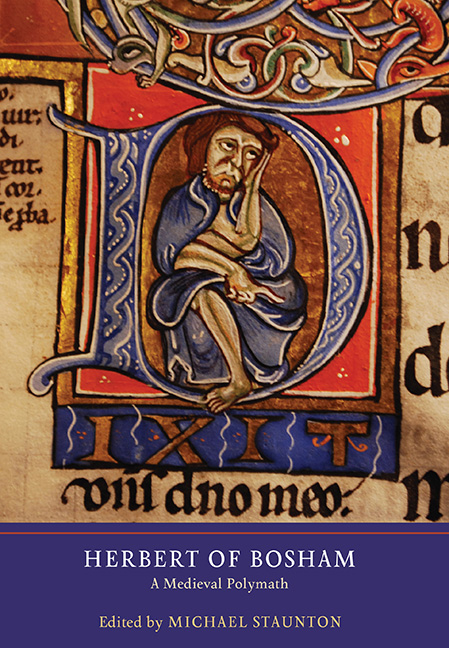Book contents
- Frontmatter
- Contents
- List of Illustrations
- List of Contributors
- Editorial Preface
- List of Abbreviations
- 1 An Introduction to Herbert of Bosham
- 2 Master Herbert: Becket's eruditus, Envoy, Adviser, and Ghost-writer?
- 3 Herbert of Bosham and Peter Lombard
- 4 Pages Covered with as Many Tears as Notes: Herbert of Bosham and the Glossed Manuscripts for Thomas Becket
- 5 Scholarship as a Weapon: Herbert of Bosham's Letter Collection
- 6 Time, Change and History in Herbert of Bosham's Historia
- 7 John Allen Giles and Herbert of Bosham: The Criminous Clerk as Editor
- 8 The Missing Leaves of Arras MS 649: A Tale of Lost and Found
- 9 Encounters with Herbert of Bosham
- Appendix: A New Letter of Herbert of Bosham (1175 x 1178)
- Select Bibliography
- Index
3 - Herbert of Bosham and Peter Lombard
Published online by Cambridge University Press: 26 March 2019
- Frontmatter
- Contents
- List of Illustrations
- List of Contributors
- Editorial Preface
- List of Abbreviations
- 1 An Introduction to Herbert of Bosham
- 2 Master Herbert: Becket's eruditus, Envoy, Adviser, and Ghost-writer?
- 3 Herbert of Bosham and Peter Lombard
- 4 Pages Covered with as Many Tears as Notes: Herbert of Bosham and the Glossed Manuscripts for Thomas Becket
- 5 Scholarship as a Weapon: Herbert of Bosham's Letter Collection
- 6 Time, Change and History in Herbert of Bosham's Historia
- 7 John Allen Giles and Herbert of Bosham: The Criminous Clerk as Editor
- 8 The Missing Leaves of Arras MS 649: A Tale of Lost and Found
- 9 Encounters with Herbert of Bosham
- Appendix: A New Letter of Herbert of Bosham (1175 x 1178)
- Select Bibliography
- Index
Summary
HERBERT of Bosham studied theology with Peter Lombard in the 1140s and 1150s. This training was crucial for his later employment. It also had a significant impact on his work, both as editor and author. Despite this, studies of Peter Lombard's school (or immediate sphere of influence) have often failed to take account of Herbert. The broad range of his activity and literary output has meant that those examining the theological tradition of Peter's Sententiae have looked elsewhere. At the same time, Herbert's own specialists have sometimes downplayed his intellectual formation in the school of the Lombard. Certainly the work that has received most attention recently, the commentary on the Hebraica, owes little to Peter Lombard. But other works are more informed by his training. It was not unusual for Peter's students to work in different areas, and none matched his complete commitment to the theological enterprise. Still, for Herbert, Peter remained ‘my master of pleasant memory’, and the editions he prepared of Peter's commentaries are a testament to this.
Peter Lombard taught theology in Paris in the 1140s and 1150s. He was under the authority of the chancellor of the cathedral school of Notre Dame, where he was a canon himself. Neither he nor his students, however, lived in the cathedral cloisters. The growing numbers of masters and students in Paris had made that impractical. Peter held various positions in the church of Paris in this period, and ultimately retired from teaching in 1159 when he was appointed bishop. The subject he taught, theology, was considered to be advanced study. Students who had completed their training in the liberal arts could choose to progress to theology, medicine or the law. In the arts it was normal to study with different masters, often in large lecture halls. Theology was different. The numbers were smaller, and students chose to study with one master at a time. By the time of the thirteenth-century university, anyone wishing to teach theology should have studied it for at least five years. In the twelfth-century schools, the period of study seems to have been longer. William of Tyre spent ‘six years uninterrupted’ studying with Peter Lombard, but still did not consider his theological training complete when his master left the schools to become bishop of Paris. He embarked on a further year of study with Maurice of Sully.
- Type
- Chapter
- Information
- Herbert of BoshamA Medieval Polymath, pp. 55 - 63Publisher: Boydell & BrewerPrint publication year: 2019



